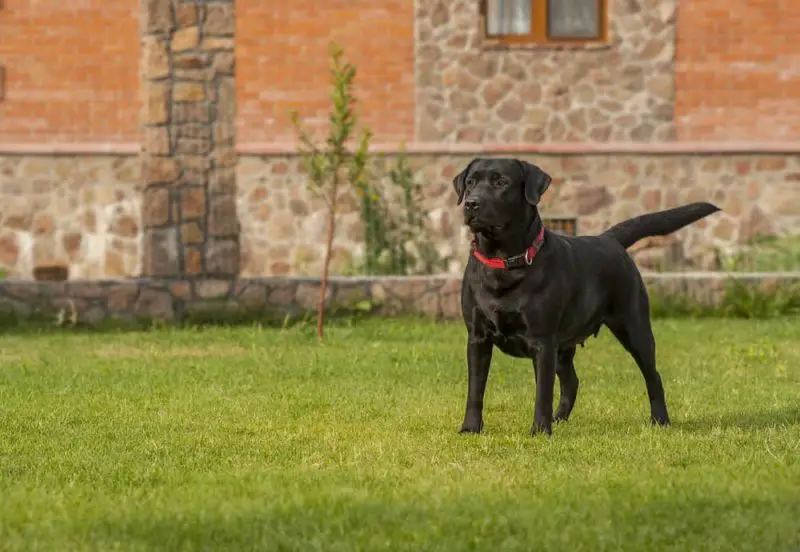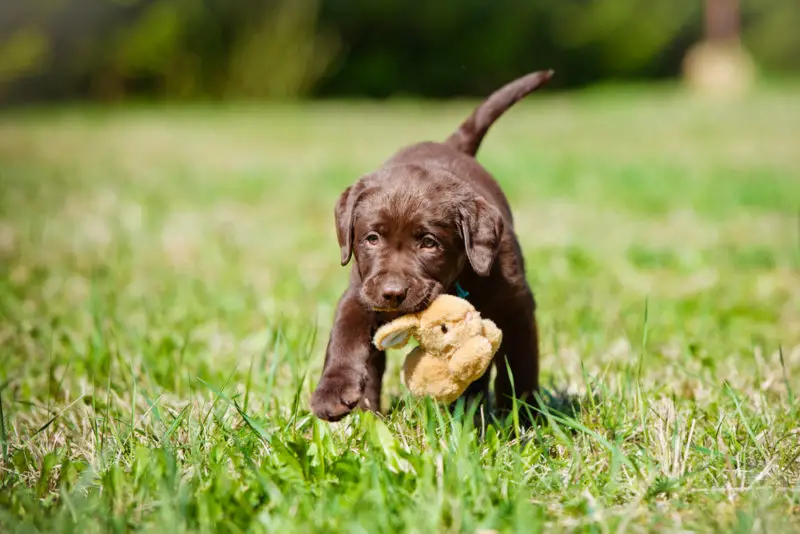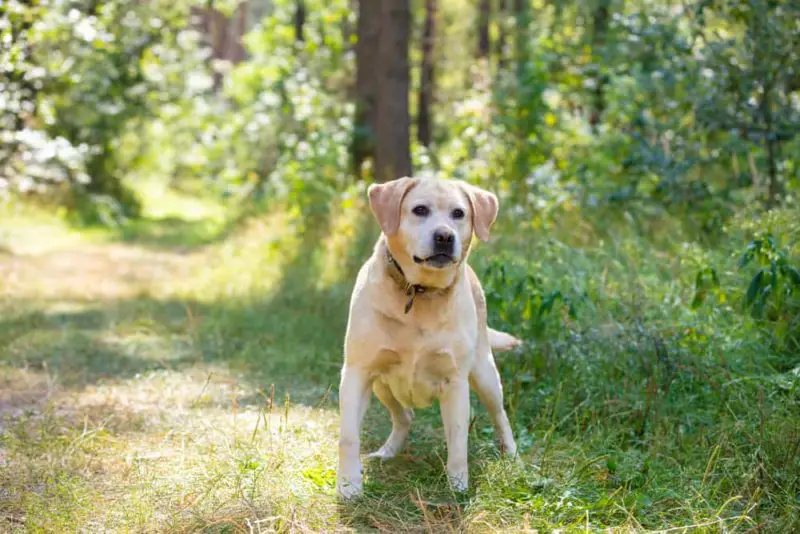
Many Labrador owners think that such a huge dog must be an outdoor creature. And then there is the ancestry of the Labrador Retriever that somewhat makes you wonder, are Labrador retrievers outside dogs?
After all, labs were originally bred as hunting and fishing dogs that spent most of their time outdoors. Their double fur coat is also a testimony to how well they can physically adapt to outdoor weather conditions.
But once you get a Lab, you will quickly realize that even though your dog loves to run around the backyard, it is better for its emotional well-being if it spends a lot of time indoors, surrounded by family. Read on to know why it is so, and what you can do if your Labrador must sleep outside.

Why Labs Do Not Make Good Outside Dogs
Give them a ground to play and the Lab will continue to run, explore and play, until the end of time. But wait, this doesn’t mean that Labs enjoy these outdoor activities alone. Here’s why.
Labradors Are Social Creatures
Labs are extremely social and must have company, especially that of the owner. If you leave your Lab outside all the time, it will look for someone to connect with. It may try to run up to and playfully greet a passerby or a neighbor.
It tries to fill the void left by you because you either went out of the house for a long time leaving the dog alone in your backyard or are busy doing your own thing inside expecting the Lab to have outdoor fun on its own. Unfortunately, it doesn’t work.
Labs Are Pack-Oriented Dogs
Your Lab needs to feel that it is a part of a pack. It doesn’t do well alone. It needs to be in a group of humans or other dogs. If you do need to keep your Lab outside, you should either go alone or have other pets or family members be outdoors at the same time to keep the dog company.
This rule applies even when your Lab stays indoors. It must be around other people to stay emotionally well.
Related post: Are Labrador Retrievers Good Family Dogs?
Can Labradors Sleep Outside?
They can, but only under the right conditions. If you have the idea of allowing your dog to simply go outside at night and then welcome it back into the house the next morning, that might not work.
The reason is that a Lab prefers to sleep inside, but can sleep outside in a comfortable kennel if the need arises. The dog also may be reluctant to use the kennel at first, especially when it realizes that you are not going to keep it company. Be patient with the training, and it will be okay eventually.

What If Your Lab Must Sleep Outside?
There may be several reasons why you chose to let your Lab sleep outside. Maybe your outdoor space is larger than the indoors. Maybe you have too many family members and it gets congested. Maybe you work late, and so on. Whatever your reason, if your Lab must sleep outdoors here are a few things you can do to ensure it gets a good night’s rest.
Provide a Warm and Comfy Shelter
Providing a secure, safe, and warm shelter for your Lab is step number one. Put some thought into building the dog house before you introduce it to your Lab. The dog shelter must be big enough for your dog to move about freely. You do not want your Lab to slouch or hunch to go inside the house or roam about when it is in. It is also recommended to put up a fence around your yard that is at least 5 feet high to prevent any possibility that your Lab escapes.
Provide Plenty of Water
Make sure your dog has access to fresh water every night when it goes to sleep outside in the kennel. Keep a big bowl filled with water inside the kennel so that if it gets thirsty in the middle of the night, it doesn’t have to scratch your door and wake you up.
Spend Time Outside with Your Lab During the Day
Remember that your Lab is reluctantly sleeping outside. In a way, it is adjusting to your needs and lifestyle. Shouldn’t you give something back? Of course, you should. Spend as much time as you can with the dog when you are both awake. That would help the dog understand the situation better and it will go to sleep in its kennel happily knowing that when the morning comes, you will be ready to play with it.
Say “Good Morning” and “Good Night” to Your Dog
Even though these greetings are mainly for humans, saying “Good morning” and “Good night” to your Lab around a fixed hour every day helps the dog get into the habit of sleeping outside. These greetings not only work as commands when you are initially training your dog to sleep in a kennel but also provide a sense of security to the dog. It knows you are there.
Related post: Do Labradors Have Separation Anxiety?

Dangers of Keeping Your Labrador Outside
If the situation calls for your Labrador to live outside, day or night, there are some dangers you must be aware of. Be mindful of these issues and decide on appropriate measures.
Labradors Develop Anxiety and Behavioral Problems
Your Lab is sweet and good-natured but can develop behavioral problems that stem from being away from their family for a long duration. Such emotional imbalances spring from separation anxiety and must be avoided if you wish your Lab to stay happy and healthy.
Labradors Can be Stolen
Labradors are one of the most sought-after dog breeds and are admired for their loyalty and playfulness. Hence, it is of little wonder that some ill-natured passer-by might think about stealing a Labrador for their keeping or selling it illegally. Labradors who are not aggressive could easily be taken, especially if they are young.
The Dog Can Develop Skin Problems and Flea Allergies
You can hardly control the toxins that are present outdoors. Your dog may be exposed to harmful chemicals or dangerous plants. There is also a high chance of it getting infected with fleas and tick bites. And many such infections could also be transferred to humans living indoors.
Labs Can Dig Under or Climb Over the Fence and Escape
If your Lab doesn’t get any sort of company for hours, it may eventually get so bored that it would want to explore whatever is on the other side of your yard. Labs are smart dogs and they can dig. So, it will not take them long to figure out how to get away, they are also very agile a could jump over the fence especially if the fence is not too high.
Weather Exposure
Both extreme heat and cold weather can have adverse effects on your Lab’s health. With high heat, there comes the danger of developing heatstroke. Similarly, prolonged exposure to excessively cold weather can cause hypothermia in your dog. If your dog is spending time outside, make sure that it has shelter from the elements, which means an isolated kennel for the winter, and provide shade and plenty of clean fresh water during the summer.
Related post: Do Labradors Get Cold in Winter?

Company Is Key
Before you get a Lab home, it is vital to evaluate whether you want your Lab to stay indoors with you or spend most of its time outside. Even though a Lab can live outdoors, it is happier inside the house where it has company.
Also, there are several safety and health concerns to think of if you plan to leave your dog out in the yard, especially at night. What is most important to remember is that whether outside or inside, Labs are at their best when you are around.


